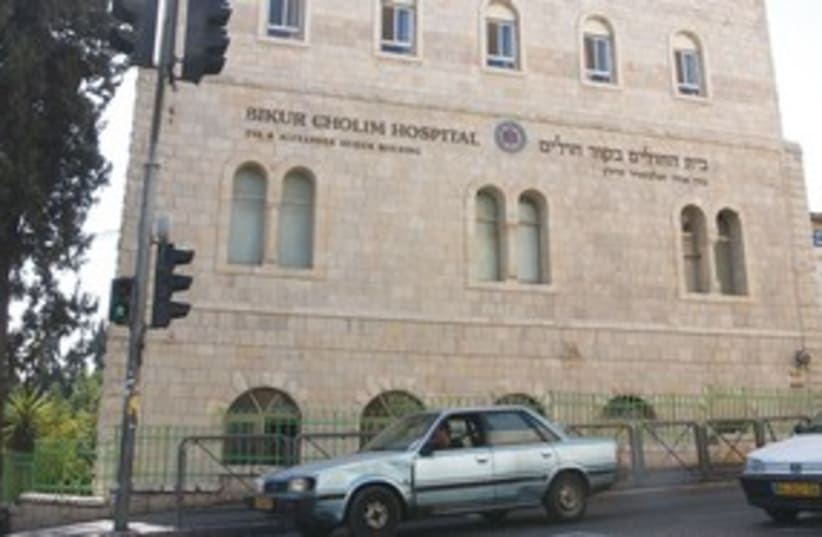Difficulties in getting the registrar of non-profit organizations to provide a certificate of proper management for the capital’s Bikur Holim Hospital is one reason why haredi businessman and journalist Dudi Zilbershlag resigned before Rosh Hashana as hospital board chairman, The Jerusalem Post has learned.Instead, former Israel Medical Association chairman Dr.Yoram Blachar has agreed to take the job. Zilbershlag, who remains on the board of the voluntary organization that runs the 120- year-old hospital in the city center on the edge of haredi neighborhoods, told the Post on Sunday that the request for the coveted approval from the registrar, Alon Bachar, who works under the aegis of the Justice Ministry, has gone unanswered for a long time.Without the certificate, the hospital cannot continue to function.The hospital is still largely owned by Israeli-Russian tycoon Arkadi Gaydamak, who left the country – apparently for good – more than a year ago and who despite running (unsuccessfully) for mayor of Jerusalem, has no intention of coming back. The voluntary organization of haredim from which Gaydamak bought his share continues to own part of Bikur Holim.Gaydamak paid $32 million for the hospital and its properties, which he has wanted to sell for more than a year. He has not given the hospital any of his own funds during that period.Zilbershlag said a few weeks ago that two vying groups, one Israeli and the other from the US, are competing to buy Gaydamak’s share and that “there should be news after the [Succot] holidays.”Zilbershlag, a publisher of haredi newspapers, said he hoped that Blachar’s appointment – along with that of former health minister from the Shas Party Nissim Dahan – to the board would induce the ministry to help the hospital.However, Blachar and Deputy Health Minister Ya’acov Litzman (United Torah Judaism) have not been on speaking terms for a long time because of the IMA’s constant fights with Litzman over the basket of health services and his intervention on medical issues due to religious concerns.Bikur Holim representatives met two weeks ago with ministry director-general Dr. Ronni Gamzu, who is currently in Moscow, but nothing resulted from that meeting, according to reports. Litzman has not intervened in the long-troubled hospital’s financial problems, allegedly because of internal disputes within Agudat Yisrael, which is part of UTJ.Asked to comment on his meeting with hospital officials, Gamzu’s spokeswoman said via e-mail that he met with hospital management and with officials from the registrar’s office.She added that his ministry has checked the hospital’s medical operations.“Even though the hospital is functioning well, there remains the concern about its functioning in the future because of its financial situation,” the spokeswoman said. “As part of its responsibility, the ministry will check that the hospital’s function is suitable from all aspects in coordination with the registrar of non-profit organizations.”Gamzu would not allow other senior-ranking ministry officials to comment until he returned from abroad.“It might be something personal,” Zilbershlag suggested when asked why the registrar’s office has balked at granting the certificate. “I don’t know what they have against me. But it has been a long time [waiting for the certificate].”Zilbershlag said that if no financial help is obtained by the end of the year, the hospital will have a deficit of over NIS 12m., which cannot be allowed, as it legally must have a balanced budget.“We are talking to the workers’ unions about making some of the paychecks a loan to us,” he added.Asked about the sudden resignation of hospital chief nurse Anita Meir, who has worked there for 40 years but has not reached full pension age, Zilbershlag conceded that “she didn’t intend to leave now, but she did.”Zilbershlag insisted that Bikur Holim is justified in continuing its service to the public because of its importance, especially to the haredi population. The number of deliveries in its obstetrics department, for example, has risen to No. 2 in Jerusalem, behind Shaare Zedek Medical Center and ahead of Hadassah University Medical Center in Ein Kerem, according to medical director Dr. Raphael Pollack.However, observers have noted the resignation of several of its leading medical experts and the much reduced activity of a number of key departments.
Blachar, who left the IMA chairmanship a year ago and works as a pediatrician, said he has a soft spot for Bikur Holim because he was a medical resident there decades ago and knows Zilbershlag. The outgoing chairman previously offered Blachar the “presidency” of the hospital (such a post did not exist) and suggested he replace Motti Shtauber, its director-general, who resigned a few months ago. Blachar turned him down, but agreed to chair the board.“If I did not think I could contribute something to the hospital, I would not have agreed,” Blachar said. “Bikur Holim has potential.”
Bikur Holim switches chairman, hopes for NGO registrar's OK
Former IMA chairman Dr. Yoram Blachar replaces haredi businessman and journalist Dudi Zilbershlag.
